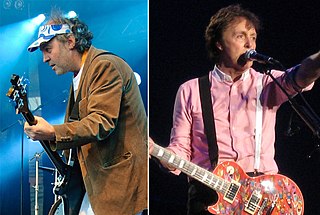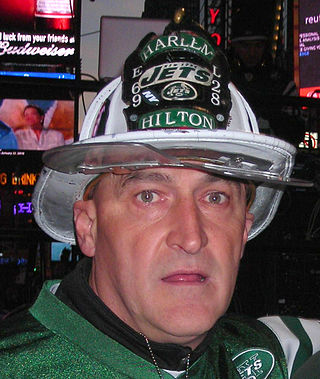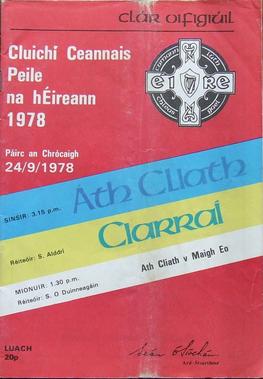Plot
This article needs a plot summary.(February 2024) |
| The Fireman's Ball | |
|---|---|
| Genre | Comedy |
| Starring | Fred Grandy Ted Knight Johnny Brown David Ketchum |
| Country of origin | United States |
| Original language | English |
| Production | |
| Executive producers | Leonard Goldberg Aaron Spelling |
The Fireman's Ball is a 1974 American TV movie. [1]
This article needs a plot summary.(February 2024) |

A fireman, stoker or watertender is a person whose occupation it is to tend the fire for the running of a boiler, heating a building, or powering a steam engine. Much of the job is hard physical labor, such as shoveling fuel, typically coal, into the boiler's firebox. On steam locomotives the title fireman is usually used, while on steamships and stationary steam engines, such as those driving saw mills, the title is usually stoker. The German word Heizer is equivalent and in Dutch the word stoker is mostly used too. The United States Navy referred to them as watertenders.

The Firemen's Ball is a 1967 Czechoslovak New Wave satirical comedy directed by Miloš Forman. It is set at the annual ball of a small town's volunteer fire department, and the plot portrays a series of disasters that occur during the evening. The film uses few professional actors – some characters are played by the firemen of the small town where it was filmed. By portraying the prevailing corruption of the local community and the collapse of even well-intentioned plans, the film satirized the communist system.

Soup to Nuts is a 1930 American pre-Code comedy film written by cartoonist, sculptor, author, and inventor Rube Goldberg and directed by Benjamin Stoloff. It was the film debut of the original four members who would later, minus Ted Healy, go on to become known as The Three Stooges comic trio. Goldberg made a cameo appearance in the film as himself, opening letters in a restaurant. Several other comedians are also featured.
The Maunesha River is a 33.5-mile-long (53.9 km) tributary of the Crawfish River in south-central Wisconsin in the United States. Via the Crawfish and Rock rivers, it is part of the Mississippi River watershed.

A train driver, engine driver, engineman or locomotive driver, commonly known as an engineer or railroad engineer in the United States and Canada, and also as a locomotive handler, locomotive engineer, locomotive operator, train operator, or motorman, is a person who operates a train, railcar, or other rail transport vehicle. The driver is in charge of and is responsible for the mechanical operation of the train, train speed, and all of the train handling. In American English, a hostler moves engines around rail yards, but does not take them out on the main line tracks; the British English equivalent is a shunter.

A fireman's carry or fireman's lift is a technique allowing one person to carry another person without assistance, by placing the carried person across the shoulders of the carrier.

Miroslav Ondříček was a Czech cinematographer who worked on over 40 films, including Amadeus, Ragtime and If.....

The Fireman is the second film Charlie Chaplin distributed by the Mutual Film Corporation in 1916. Released on June 12, it starred Chaplin as the fireman and Edna Purviance as the daughter to Lloyd Bacon.

The Fireman is an English experimental music duo of Paul McCartney and Youth formed in 1993. Although they first formed in 1993, their first album was recorded in 1992 when in that same year, Youth was asked by McCartney to assist him in mixing McCartney's at the time new album Off the Ground which would be released in February. However they wanted to expand their partnership farther than solely focusing on McCartney's solo work so they began recording what would become their debut album Strawberries Oceans Ships Forest.

Edwin M. Anzalone, better known as Fireman Ed, is a well known fan of the New York Jets. One of the most well-known National Football League fans, he has risen to prominence by appearing on many local radio shows. He is known for leading the crowd in the team chant, "J-E-T-S, Jets!, Jets!, Jets!", which originally was led by two retired NYPD Jet fans – alternating from one end zone to the other end zone, in the upper deck only. An actual New York City firefighter, Fireman Ed was injured on the job in 2007. During the butt fumble game, a rout of the Jets by the New England Patriots on Thanksgiving night 2012, Anzalone left the game before halftime, stating that he would no longer lead cheers at Jet games as Fireman Ed. At the first game of the 2015 NFL season, Fireman Ed returned to lead cheers for the Jets.
The 1924 Philadelphia Phillies season saw the Phillies climb out of last place and into seventh and home attendance improving to over 299,000. Cy Williams led the team in home runs with 24.

Fireman Sam is an animated children's television series about a fireman named Sam, his fellow firefighters, and other residents in the fictional Welsh rural village of Pontypandy. It was broadcast for the first time in November 1987 on Welsh TV channel S4C and is shown in more than 155 countries across the world.
Fireman Save My Child is a 1918 American short comedy film starring Harold Lloyd.

Electric Arguments is the third album by the Fireman. The album was first announced 29 September 2008, on Paul McCartney's website, and was released on 24 November 2008 on the duo's website. It is the first Fireman release to be publicly acknowledged by McCartney, and the album cover features the names of both contributors in contrast to the anonymity of earlier works.
The fireman's rule is a common law or statutory restriction on tort actions by public safety officials. In general, the fireman's rule bars lawsuits by firefighters, police officers and, in some jurisdictions, all government safety professionals from collecting on damages that occur in the course of their duties even in cases of clear negligence by other parties.

The 1978 All-Ireland Senior Football Championship Final was the 91st All-Ireland Final and the deciding match of the 1978 All-Ireland Senior Football Championship, an inter-county Gaelic football tournament for the top teams in Ireland.
Future Generations: Small People was a three-minute promotional trailer for Children in Need, put together by the BBC and Gorgeous Productions in 1998 as a sequel of sorts to the great success of the previous year's Perfect Day charity single.
The 1974 Pacific Coast Open, also known by its sponsored name Fireman's Fund International, was a men's tennis tournament that was part of the Grade AA category of the 1974 Grand Prix circuit. The event was played on indoor hard courts at the Cow Palace in San Francisco, United States. It was the first time the venue was used for the tournament which was the 86th edition and ran from September 24 through September 30, 1974. Unseeded Ross Case won the singles title and the accompanying $16,000 first prize money and 80 Grand Prix points.

"At the Devil's Ball", also spelled "At the Devils Ball", is a song composed by Irving Berlin. There are three published editions of the song's lyrics—the first was registered for copyright on November 14, 1912; the second and third editions were registered on December 17, 1912, and January 8, 1913, respectively. The song's lyrics are written in first person, and convey a dream about a visit to a formal dance party in Hell, hosted by the Devil.